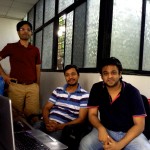Dhruvil Sanghvi Co-Founded LogiNext Solutions along with Manisha Raisinghani. They studied together at Carnegie Mellon and specialized in Business Intelligence and Data Analytics. Dhruv went into the consulting space and had stints with E&Y and Deloitte in Chicago. Manisha on the other hand went into technology and worked with Mastek and IBM in New York. They constantly met and discussed on what to begin and because of their experience in serving logistics and e-commerce clients in the US, they figured out that the logistics industry in emerging markets was a bit underserved.
Since they had limited cash, they relocated to India instead of being in the US to keep their cash burn low. Dhruvil says that he spoke to a lot of people to validate their assumptions but did not accomplish anything substantial because people were not keen in spending their time with a startup and give them guidance. Dhruvil, at that point in time had only a website and a very basic product and some designed screenshots. Dhruvil decided to have a great online presence by Feb 2014 and did some free online and offline brand building which created initial awareness about LogiNext.
Dhuvil talks about simple methods with which he reached out to the media world. Dhruvil recollects attending a Headstart event in Mumbai where he met a couple of journalists and spoke about the product. He met them again after two months and showed them a demo of the developed product. This got them into being featured by Economic Times and Dhruvil says that this alone got them around 20 enquiries as people were just curious to find out what this company was doing.
As he went into these 20 meetings, he realized that they were far too abstracted from the market in terms of the needs and hence was not able to convert these into deals. They thought through what else went wrong and figured out that these early stage prospects hesitated in working with a new company. They also found out that some established companies were claiming to do similar things which led to some competition. Dhruvil had enough of data points to take a decision to focus on building a brand for the next couple of months rather than selling. The team got into a full-fledged branding initiative in March 2014 and got to be known by a lot of people both from an investment as well as a customer point of view. This got them enquiries from large companies like Coca-cola, Hindustan Unilever, Berger Paints etc. However, when they offered free trials Dhruvil figured out that they had to spend time on the product also to show the clients that there is value add and branding did not necessarily help them beyond a point. Dhruvil says that the customers very clearly understand the traditional and semi-traditional techniques that the companies use in creating a buzz and one cannot get too far by only focussing on branding. Dhruvil, at this point in time realized that they can never be a sales driven company but can only be a product driven company.
In June 2014, after spending a lot of time in developing a better product that the market wanted, they went back to the same sets of prospects and showed them the progress and made the prospects try the product. The prospects did not want to buy it upfront but the meetings generated a lot of initial usage traction and buzz because the product was good. Dhruvil recollects that a senior person in the industry sent a message to WhatsApp group which had lots of CIOs and CEOs in the industry about this product right after their meeting which got them lots of enquiries again. Dhruvil says that all these C-Level people were well connected and every one comes to know within seconds about what new is coming up in the market.
Dhruvil talks about the importance of networking with the right people in the industry. Dhruvil says that Carnegie Mellon alumni and alumni of other top schools were quite reachable and helpful to make connects with potential buyers. Even 15 connects leading to 5 conversations used to land a deal in his lap as these connects were super relevant. They never spent any money on PR as there are many magazines today that speaks about startups. Even though it is good to get ranked as the Top 10 or the Top 50 startups of India , Dhruvil advices startups to go a bit cautious on this because people know which ones are paid and which ones are genuine. The media focus helped them in four directions – Hiring, In-Bound leads, Marketing and Traction.
On the sales closures, they made quite a few mistakes initially since they did not have any experience in Corporate Sales in India. They even lost three to four prospects before they closed their first one. Their sales cycle takes around three to six months but in the initial days they tried closing deals within 15 to 20 days which cost them a lot. Dhruvil says that they were trying to push the deals but did not realize that the customer in large setups needs to be comfortable in working with startups. In smaller companies, the decision maker is one and the time and the risk perspective is small unlike the corporates where there are multiple decision makers and the quantum of risks, reputations and concerns are very high. They gave trials, sent the NDA and early proposals to unqualified prospects but nothing happened because they pushed hard ahead of time. Dhruvil says that Sales people/ Founders should be clear on the prospects busy schedules also. He quotes one instance, when his follow-ups coincided with Diwali time where all the logistics companies in India gets to be busy with their seasonal peak loads which he did not realize then. There was a sudden disconnect because no prospects responded to his constant followups. The team gave up because they thought that the prospects were not interested but were shocked when they found that some other company had picked up the business after a few months because they did not follow up. Dhruvil also says that one should not look desperate as all these large corporates are used to meeting so many sales people and hi-tech startups and desperateness only puts the company in bad light.
Dhruvil says that large corporates have multiple teams on Security , Compliances, Technology, Business and even in cases when a few of those users wanted the product, there were internal blocks because the companies had policies of not working with any vendor that had less than 20 employees and Dhruvil had only 6. In-spite of all of the pluses of Needs matching with the product, Interests shown, Qualifying, POC to name a few, they still lost deals because of the company policies. Dhruvil says that it is always good to have one senior person who understands these things and would guide the process to shorten the closure. Because of the focus on developing a great product, the POCs were fairly smooth. They made sure that they were product minded but also ensured that they did not ignore the customer and periodically kept updating the product based on the market
Dhruvil’s suggestion to early stage entrepreneurs – Develop a great product but don’t run blindly behind investors. He suggests that the startups should evaluate their business model and should take a conscious decision on who to meet within the VC community and how much they want as funds. He says that the valuation will be high when there is a product and a team and suggests the founders to approach VCs after this stage. He also says that the team should be a good mix of senior and junior people. To hire their team in sales, they always look out for previous startup experience in these candidates as they are the ones who will know how difficult it is to survive through the first year.
LogiNext today has around 15 employees and have raised their first round of funding from Asia’s largest seed investor group, Indian Angel Network. They have been featured many times in YourStory, Economic Times and Mint.






